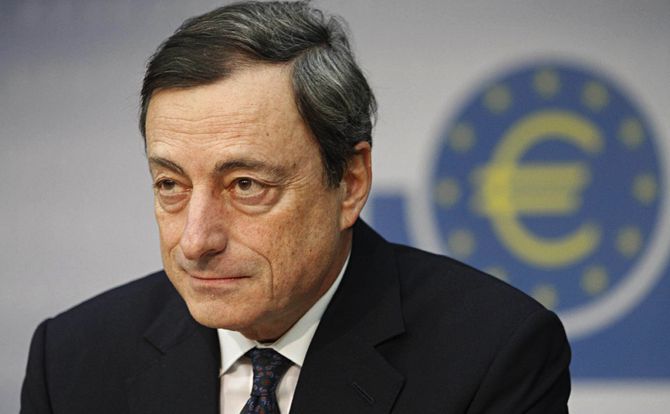The European Central Bank – independent and unaccountable?
The ECB has earned a reputation as one of the world’s most independent monetary policy authorities. The ECB has no fiscal counterpart pressuring it to manipulate interest rates. Yet as the scope of its activities has expanded, mechanisms for ensuring transparency and accountability of the ECB have not always kept up.

In a nutshell
- Basic EU law sets the ECB’s independence above legal and political accountability
- This was not problematic until the past decade, when the bank’s powers grew dramatically
- The ECB’s internal safeguards may not suffice without effective external audit
For the past few years, a dialogue of the deaf has been going on between the European Court of Auditors (ECA) and the European Central Bank (ECB). The first institution keeps accusing the second of holding back useful data concerning the supervision of Europe’s largest banks. Without this information, the ECA claims it is unable to properly assess the ECB’s “operational efficiency of crisis management” and thus feels impeded in exercising its mission as defined by the Treaty on the Functioning of the European Union (TFEU).
“External public audit is an essential element of a democratic society and the rule of law in the EU,” is how the ECA put it in a recent communication to the European Parliament. Accountability is especially important in banking supervision, where the stability of financial systems is at stake, the audit body asserted.
In a written reply to one parliamentarian’s inquiry, ECB President Mario Draghi denied that his institution had ever refused to disclose audit information. On the contrary, he said, the ECA had been given “more than 500 documents, totaling almost 6,000 pages of documentation,” and 38 meetings and teleconferences were held while the auditing organization prepared its special report on ECB banking supervision.
Constitutional puzzle
The roots of this inter-institutional malaise can be traced back to apparently conflicting dispositions in the TFEU itself. While Article 287 clearly equips the ECA with audit powers over the ECB, Article 282 stipulates that the latter “shall be independent in the exercise of its powers and in the management of its finances” and, therefore, must not “seek or take instructions” from EU “institutions, bodies, offices or agencies, from any national government or from any other body,” as ECB Executive Board member Sabine Lautenschlaeger explained in a June 2017 letter to Christine Lagarde, the managing director of the International Monetary Fund (IMF).
Excluding the ECB from the democratic process by law is supposed to protect it from political interference.
Excluding the ECB from the democratic process by law is supposed to protect it from political interference. Since its creation in 1998, the Frankfurt-based institution sticks out as one of the world’s most independent central banks. Unlike its national peers, the ECB has no fiscal counterpart pressuring it to manipulate interest rates.
Two sides
Being independent does not mean the ECB is not accountable. Rather, independence and accountability are described by most central bankers as “two sides of the same coin.” As Executive Board member Benoit Coeure puts it, “independence ensures that the ECB can act in line with its mandate; accountability, on the other hand, ensures that the ECB does act in line with its mandate.”
The question of the right balance between the ECB’s independence and its (legal and political) responsibility to account for its actions is far from being settled in practice, however, especially since the Bank’s mandate has evolved considerably since the global financial crisis.
Legal precautions
Economists usually consider central bank independence as a prerequisite for guaranteeing financial stability. But there is a condition attached: the institution’s legal mandate must be defined as narrowly as possible.
This was the case 20 years ago, when the ECB was created. The bank’s first mission was to launch the eurozone’s common currency. Thereafter, besides its mandate to maintain the (internal and external) value and reputation of the euro, its key role was to guarantee price stability, notably by varying the level of official short-term interest rates.
In exercising its standard monetary policy function, the ECB has from the start been subject to a range of constitutional prohibitions designed to prevent it from encroaching on the prerogatives of fiscal policy. Firstly, the so-called “no bail-out clause” forbids the ECB to rescue defaulting sovereigns. Secondly, Article 123(1) of the TFEU bars the bank from purchasing debt instruments directly from governments. This means that distressed member states cannot turn to the ECB for “monetary financing.” The idea is that countries should remain exposed to market discipline when borrowing on capital markets, thus incentivizing them to maintain sound finances.
Draghi’s promise
The ECB had a smooth ride during its first decade. Euro-area economies were doing well, with satisfactory levels of economic growth and low, stable inflation rates. Then, the financial tsunami unleashed by the collapse of Lehman Brothers in 2008 put a brutal end to the tranquil era of “the Great Moderation.”
The new motto was that exceptional circumstances require exceptional measures – many lasting for years.
Confronted with a cascade of major European bank failures – which threatened to drag into the abyss heavily indebted governments that had rushed to the rescue of their national banks – the ECB soon needed to significantly expand the scope of its activities. The situation became critical when several euro area member states found themselves unable to repay or refinance their public debt or to bail out defaulting banks without external assistance.
Facing an unprecedented shock to Europe’s financial system, the ECB would not risk sitting back and waiting for markets to ride out the storm. As the sovereign debt crisis escalated in mid-2012, President Draghi proclaimed in a now-famous speech that, within its mandate, the ECB would do “whatever it takes” to preserve the euro against destructive speculation. These words alone sufficed to stabilize sovereign bond markets. By this tour de force of communications strategy, the ECB had succeeded in winning back markets’ faltering confidence in the euro, thereby avoiding the worst.
Unorthodox policies
Mr. Draghi’s legendary commitment to save the euro was backed up by a new policy allowing the ECB to buy (on secondary markets) “unlimited” amounts of sovereign bonds of distressed countries. In return, the latter had to promise to implement drastic macroeconomic reforms. This program, known as Outright Monetary Transactions (OMT), was finally never activated. Still, the mechanism remains in place – just in case.
Other “unconventional” or “nonstandard” balance sheet policies, such as the expanded Asset Purchase Programme (APP), including the so-called Public Sector Purchase Programme (PSPP), led the ECB away from its precrisis constitutional blueprint. Its new motto was that exceptional circumstances require exceptional measures – many of which ended up lasting for years, or even becoming permanent.

Supervisory power
Today, thanks to Quantitative Easing, the ECB holds titanic portfolios of government bonds. At the same time, it is policing the financial industry. Through the Single Supervisory Mechanism (SSM), the central bank “directly” supervises 117 of Europe’s biggest commercial lenders (together representing 82 percent of the eurozone’s banking assets), while exercising “indirect” oversight over all the others. The SSM’s creation in 2014 was a significant step in empowering the ECB.
In the postcrisis decade, the ECB has asserted itself as a dominant force in European governance. The bank’s broader influence and involvement in global regulatory bodies, such as the Financial Stability Board or the Basel Committee on Banking Supervision, should also be noted. For example, Mr. Draghi chairs the oversight body of the Basel Committee (the Group of Governors and Heads of Supervision, or GHOS), which plays a crucial role in finalizing international prudential regulation of the banking sector.
Transparency talk
While expanding its scope, the ECB has increased its efforts to appear more accountable, mainly through better communication about its targets and actions. To this purpose, the bank has used various channels, including online publications, information campaigns, forecast bulletins, press conferences and public speeches.
In addition, the Bank has lately enriched its integrity framework with a new “ethics regime,” implemented by a specially created Compliance and Governance Office. Among other things, the office handles queries from the ECA and the European Ombudsman. Regular internal audits and even an ECB-specific Audit Committee help paint the picture of an institution that puts forward transparency as a key value.
The ECB’s cooling-off periods for staff are seen as too short to avoid revolving-door appointments.
Still, the translucent surface – built upon layers of external and internal accountability – conceals a certain degree of opacity. In a 2017 report, Transparency International (TI) outlined a series of institutional flaws at the ECB. One is the central bank’s not-so-impartial Ethics Committee, which is chaired by former President Jean-Claude Trichet.
Conflicts of interest, insider trading and undue influence by lobbyists and pressure groups on high-level officials remain a concern. Such abuses have certainly not been eradicated by measures such as the publication, on the ECB’s official website, of Executive Board members’ daily diaries.
Above all, Transparency International regards the cooling-off periods of ECB staff (three to 12 months for non-supervisors, up to two years for senior officials, and only one year for Governing Council members) as too short to avoid “revolving-door” appointments. Banking supervision is particularly vulnerable to regulatory capture. In recent years, some of the ECB’s top supervisors and executives have moved on to lucrative private finance appointments once their mandates came to an end. For others, it worked the other way around (Mr. Draghi, for instance, was vice president of Goldman Sachs Europe prior to his nomination at the ECB).
Such comings and goings could undermine the faith of ordinary Europeans that the ECB and its technocrats will act in the public interest. According to watchdogs like TI, transparency is a key element in restoring citizens’ wavering trust. But will it be enough?
Empty exercise
Letters may be written, documents transferred between institutions, meetings held where policies are extensively explained, but in the end, neither the ECA nor the European Ombudsman, and even less the European Parliament and the citizens it represents, seem to have the slightest ability to really make the ECB answer for its decisions.
Members of the European Parliament rarely pose relevant questions to monetary policymakers, according to one recent study. Even when information is delivered, lawmakers often fail to follow up – as if they assumed transparency suffices for its own sake. An example is the ECB’s controversial “fail or likely to fail” assessment of three ailing European banks (Banco Popular, Veneto Banco and Banco Popolare di Venezia). Nonconfidential information on these cases was released in late 2017, after massive pressure from the European Parliament. Yet, once it was out, there was little reaction
A German research team asserts that ECB accountability increasingly resembles an empty, procedural exercise.
As a German research team asserts, ECB accountability increasingly resembles an empty, “procedural” exercise that can easily be performed by such a well-resourced institution, without any “substantive” scrutiny of the bank’s monetary and supervisory decisions.
But what could auditors or ethical watchdogs do if they detected irregularities or ill-conceived policies at the ECB?By EU law, only the Court of Justice of the European Union (CJEU) has the power to impose penalties for proven infringements or errors. In the absence of sufficient democratic control, judicial review appears to be the only tool for deterring the ECB from discretionary overreach.
Nonetheless, in the rare complaints referred to it, the CJEU has yet to make use of this prerogative.
Judicial deference
An oft-cited example of this lack of effective oversight is the ECB’s controversial role in the Troika. Along with the European Commission and the IMF, the bank had forced Greece to accept intrusive (and, in hindsight, highly destructive) austerity measures in exchange for massive loans. Other heavily indebted EU countries (including Ireland, Cyprus, Portugal and Spain) were later offered bailouts under scarcely less drastic terms.
The ECB’s participation in these operations was widely condemned as a breach of the “no-bailout clause.” In 2012, at the initiative of an Irish parliamentarian, the case was brought to the EU court. In the end, however, the CJEU ruled that the ECB did not overstep its mandate, even though the judges had to perform great formalistic contortions to come to that conclusion.
Other cases referred to the CJEU (including one by the German Bundesverfassungsgericht questioning to what extent the ECB’s bond-buying programs violate the ban on central bank financing of budget deficits) confirm that EU judges are reluctant to threaten the ECB’s sacrosanct independence by second-guessing its policy decisions.
Wasted asset
The future trajectory of ECB independence is momentarily clouded by the fact that half of its Executive Board (including its charismatic president) and over a third of its Governing Council will be replaced this year. This comes amid a very rare (once in 40 years) simultaneous leadership change at three major EU institutions: the ECB, the European Commission and the European Council.
Future monetary policy will largely be shaped by the caliber of these new decision-makers, who will soon have to deal (once again) with a slowing European economy. It would not augur well if their selection favored politics over qualifications. This would squander the ECB’s main asset: the trust it can inspire in times of crisis.








